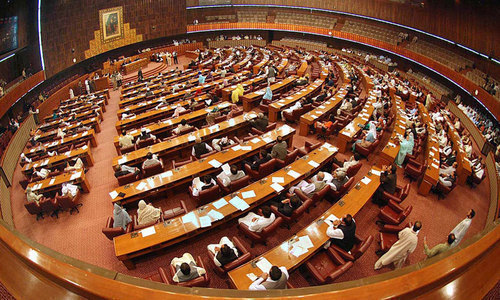LAHORE: The Lahore High Court (LHC) has ruled that a non-Muslim is not entitled to inherit any share from the estate of a Muslim relative, either as a successor or predecessor.
Justice Chaudhry Muhammad Iqbal issued the ruling upholding the decisions of two lower courts regarding a devolution of a land measuring 83 kanals in Gojra tehsil of Toba Tek Singh district.
The landowner was Muslim by faith and after his demise the property was devolved to his children — three sons and two daughters.
However, a Muslim grandson of the deceased challenged the mutation in favour of one of his uncles while alleging that the latter was an Ahmadi by faith and as such he could not inherit the property from the estate of his deceased Muslim father.
The courts decreed in favour of the grandson who sought cancellation of the subsequent mutations. During the cross-examination, one of the heirs of the non-Muslim man also testified that his father was an Ahmadi.
Justice Iqbal observed it was an admitted position that the man was an Ahmadi by faith, but he did not disclose the same while incorporating the inheritance mutation of his Muslim father. “It is settled law that admitted facts need not to be proved,” the judge maintained.
The judge asserted that as per Sharia, the estate left by a deceased Muslim owner cannot be inherited by a non-Muslim heir. To explain this point, he quoted the saying of the Holy Prophet (peace be upon him) from Vol. 4 of Sahih Muslim: “A Muslim does not inherit from a disbeliever and a disbeliever does not inherit from a Muslim.”
Justice Iqbal observed that in the British rule the personal laws of the respective communities dwelling in India were protected through promulgation of legislated law. Similarly, he said, the Muslim Personal Laws were also made applicable to the Muslims through Muslim Shariat Application Act, 1937. Therefore, he added, the canon of the Holy Quran and Sunnah are applicable to inheritance of the estate of a deceased Muslim.
Considering these facts, the judge ruled that a non-Muslim was not entitled to inherit any share from the estate of his Muslim relative as successor or predecessor. Also, the provisions of Article 260(3), which defines the terms Muslim and non-Muslim for legal purposes, are applicable, retrospectively, he explained.
The LHC noted that the trial court rightly decreed the suit, which was lawfully upheld by the appellate court.
While dismissing the petition, the judge concluded, “The concurrent findings of fact are against the petitioners which do not call for any interference by this court in exercise of its revisional jurisdiction in absence of any illegality or any error of jurisdiction.”
Published in Dawn, December 28th, 2024















































